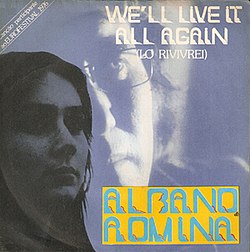| "We'll Live It All Again (Lo rivivrei)" | |
|---|---|
 | |
| Single by Al Bano and Romina Power | |
| from the album 1978 | |
| Released | 1976 |
| Length | 4:07 |
| Label | Libra |
| Composer | Detto Mariano |
| Lyricists | |
| Eurovision Song Contest 1976 entry | |
| Country | |
| Artists | |
| As | |
| Languages | |
| Composer | |
| Lyricists |
|
| Conductor | |
| Finals performance | |
| Final result | 7th |
| Final points | 69 |
| Entry chronology | |
| ◄ "Era" (1975) | |
| "Libera" (1977) ► | |
"We'll Live It All Again (Lo rivivrei)" is a song recorded by Italian-American duo Al Bano and Romina Power, with music composed by Detto Mariano and lyrics written by Albano and Romina themselves. It represented Italy in the Eurovision Song Contest 1976 held in The Hague.
